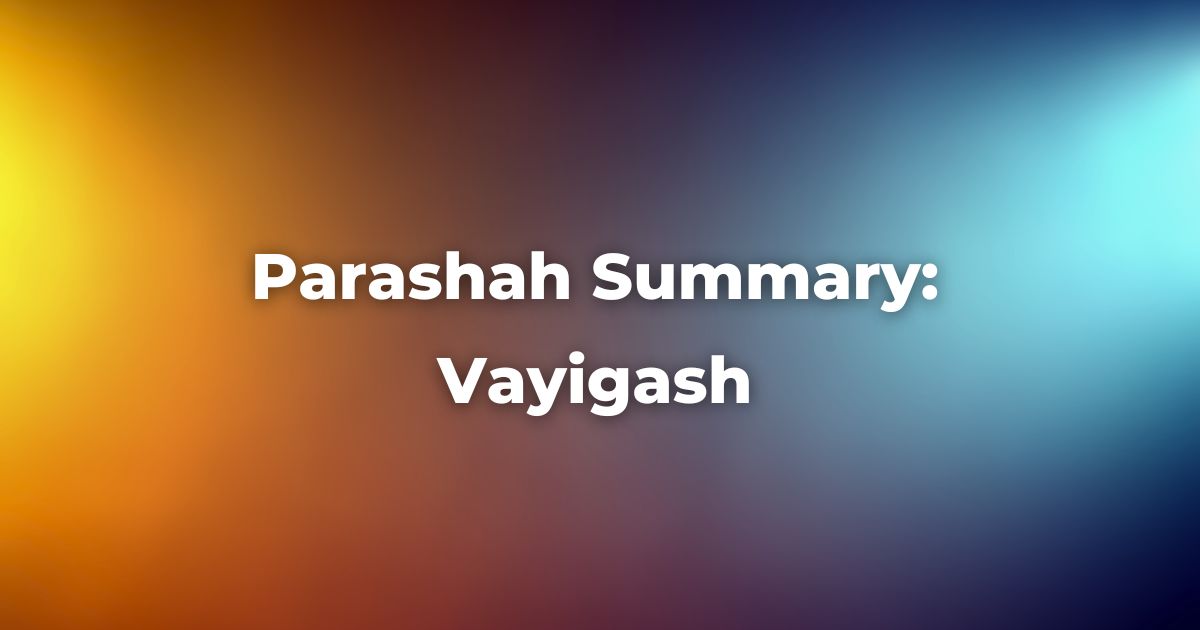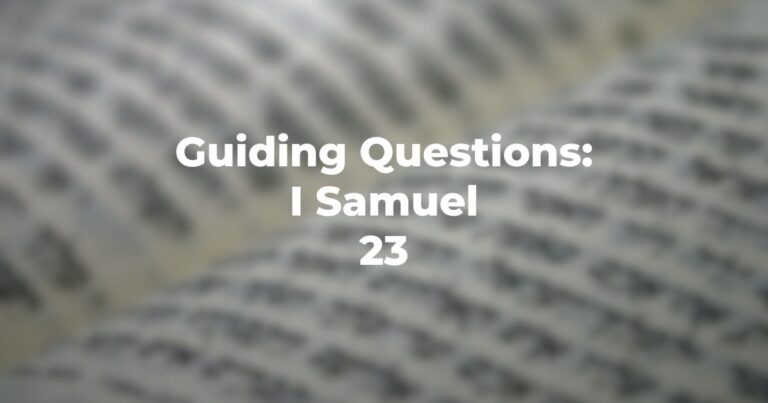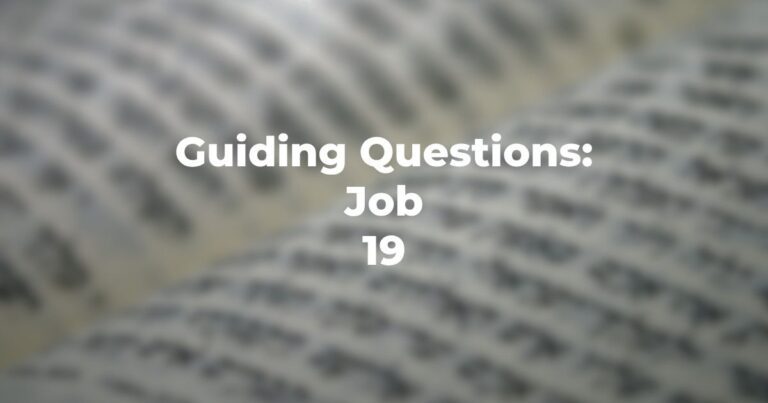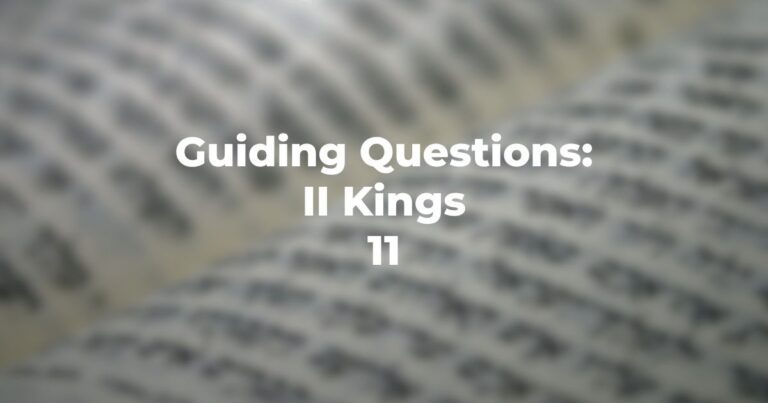Summary
This is the final third of the Joseph story. Joseph reveals himself to his brothers and moves his family to Goshen, where they prosper. The Israelites become increasingly in debt to Pharaoh (and Joseph). By the end of the famine, Pharaoh owns all of their money, livestock, and land. Joseph gives the people seeds to plant, and they agree to give Pharaoh 20% of what they grow.
Aliyah-by-Aliyah Summary
1st Aliyah: Genesis 44:18-30
Judah reminds Joseph of the most recent interaction that brought him and his brothers before Joseph. He explains how distraught their father will be if anything bad happens to Benjamin since his brother is dead (Joseph himself).
2nd Aliyah: Genesis 44:31-45:7
Judah begs to take Benjamin’s place as Joseph’s slave out of concern for his father’s feelings. Joseph sends away his attendants and reveals who he is to his brothers. Their reunion was so loud that it could be heard throughout Egypt. Joseph reassures them that they should not be upset, but that God had sent Joseph ahead of them.
3rd Aliyah: Genesis 45:8-18
Joseph absolves his brothers and tells them that everything is going according to God’s will. He begs his brothers to return to Jacob, let him know that Joseph is alive, and move the family to Egypt, where Joseph can take care of them. Pharaoh hears that Joseph’s brothers have come, and he also tells them to relocate to Egypt.
4th Aliyah: Genesis 45:19-27
Joseph provides them wagons, supplies, and presents for his father. The brothers return home and tell their father that Joseph is alive and wants them to move to Egypt together. After initial disbelief, Jacob’s spirit is revived by the thought that his son is still alive.
5th Aliyah: Genesis 45:28-46:27
Jacob sets out for Egypt, stopping at Beer-sheva on the way. God reassures Jacob that God will be with him and his family in Egypt. The names of Jacob’s family members who go to Egypt with him are listed.
6th Aliyah: Genesis 46:28-47:10
Joseph greets his family and informs Pharaoh of their arrival. Pharaoh allows them to settle in Goshen, because most Egyptians don’t want shepherds living in their midst. Pharaoh asks Jacob how old he is, and Jacob replies that he is 130 years old.
7th Aliyah: Genesis 47:11-27
The famine is severe, and when the people run out of money for food, Joseph accepts livestock as payment. When that also runs out, Joseph takes land in exchange for bread. As the famine ends, Pharaoh moves the people around, and Joseph gives them seeds to plant. (Maftir: Genesis 47:25-27) The people agree to give 1/5th of what they grow to Pharaoh. Israel (the Jewish people) are fertile, and their numbers increase.
Triennial Breakdown
Note: For more information about the tradition of spreading the TorahRefers to the first five books of the Hebrew Bible, the Tanakh, also called the Five Books of Moses, Pentateuch or the Hebrew equivalent, Humash. This is also called the Written Torah. The term may also refer to teachings that expound on Jewish tradition. Read more readings over a 3-year cycle see here.
| Aliyah | Year 1: 44:18-45:27 | Year 2: 45:28-46:27 | Year 3: 46:28-47:27 |
|---|---|---|---|
| 1 | 44:18-44:20 | 45:28-46:4 | 46:28-46:30 |
| 2 | 44:21-44:24 | 46:5-46:7 | 46:31-46:34 |
| 3 | 44:25-44:30 | 46:8-46:11 | 47:1-47:6 |
| 4 | 44:31-44:34 | 46:12-46:15 | 47:7-47:10 |
| 5 | 45:1-45:7 | 46:16-46:18 | 47:11-47:19 |
| 6 | 45:8-45:18 | 46:19-46:22 | 47:20-47:22 |
| 7 | 44:19-45:27 | 46:23-46:27 | 47:23-47:27 |
| Maftir | 44:25-45:27 | 46:23-46:27 | 47:25-47:27 |
Triennial Summaries
Year 1: See Aliyot 1-3
Year 2: See Aliyot 4-5
Year 3: See Aliyot 6-7
Haftarah Summary
Haftarah: Ezekiel 37:15-28
God tells Ezekiel to take two sticks, one representing Joseph and the other representing Judah and hold them together while declaring that God will gather the Israelites from among the nations and bring them together in the land of Israel.
See our Haftarah breakdown here.
Author
-
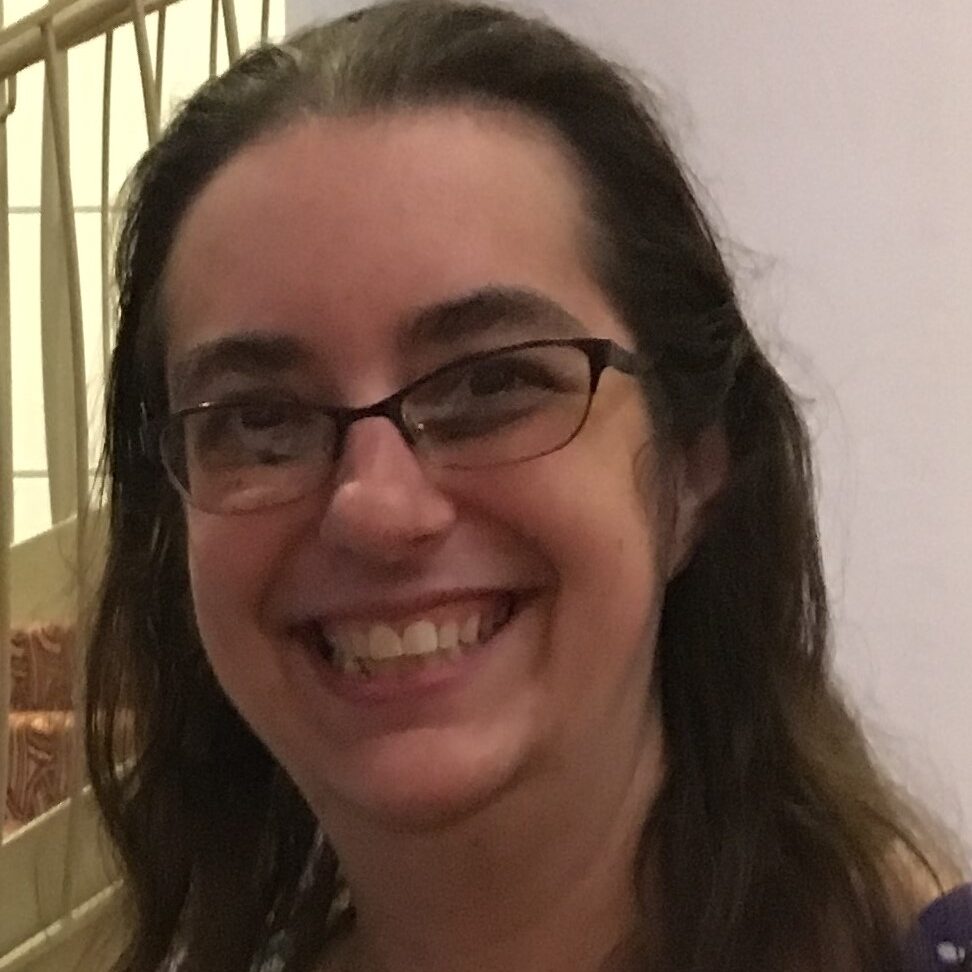
Rabbi Suzanne Brody is a passionate Jewish educator, writer, reader, and crochet enthusiast. She is the Director of Ithaca Beit MidrashLiterally, “house of study,” it refers to a school or a communal study hall. Plural: Batei Midrash Read more (www.ithacabeitmidrash.com) and hopes you’ll join her for a class or two! Rabbi Brody is also the author of multiple books of poetry and fiction (available on Amazon). When she is not at her computer or by the lake writing, Suzanne can be found teaching in both formal and informal Jewish educational settings or enjoying time with her husband, their two teens, and cuddling with their dogs and cats.
View all posts https://www.amazon.com/s?k=suzanne+brody&crid=20HPAG70405E9&sprefix=suzanne+brody%2Caps%2C207&ref=nb_sb_noss_1

